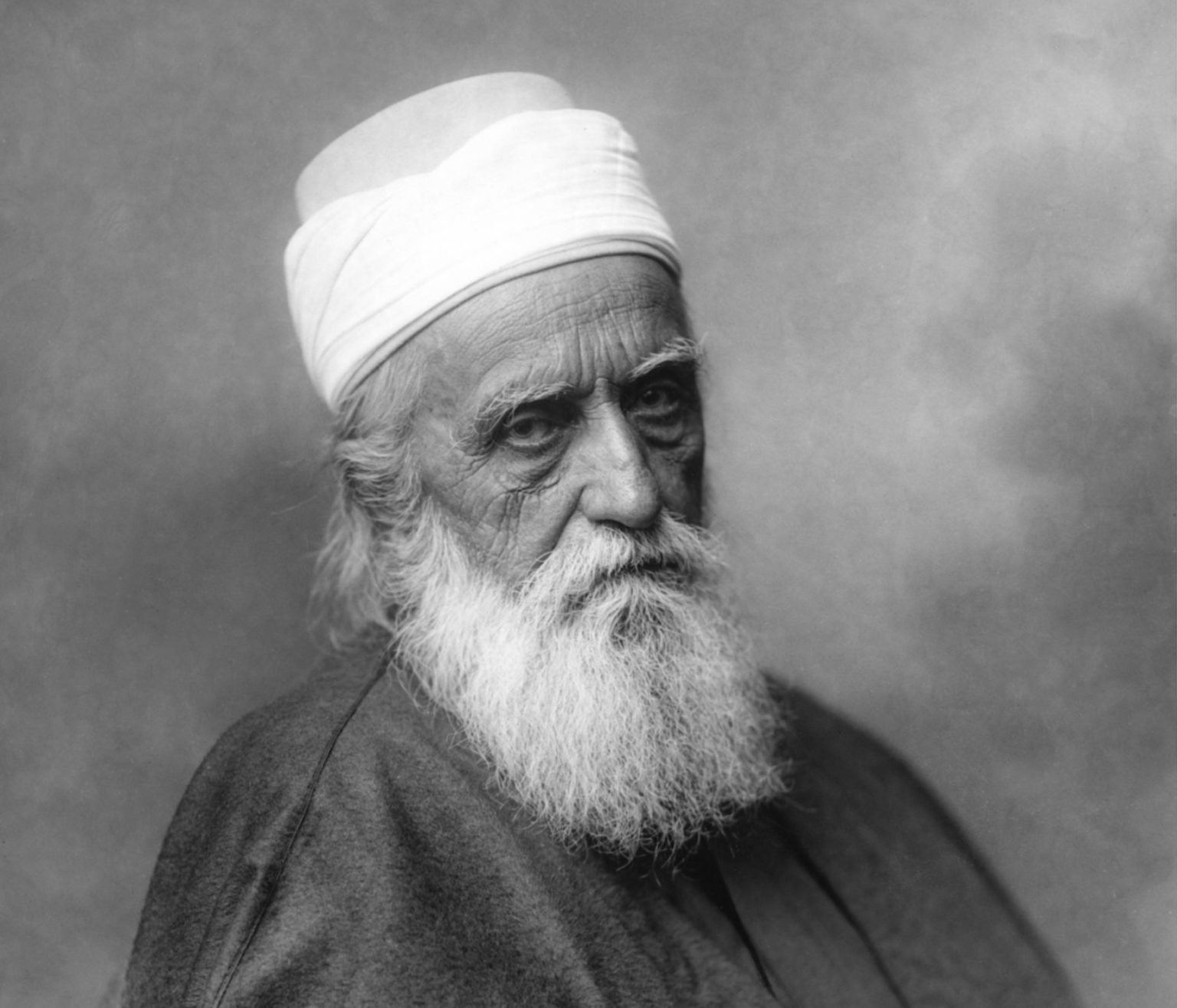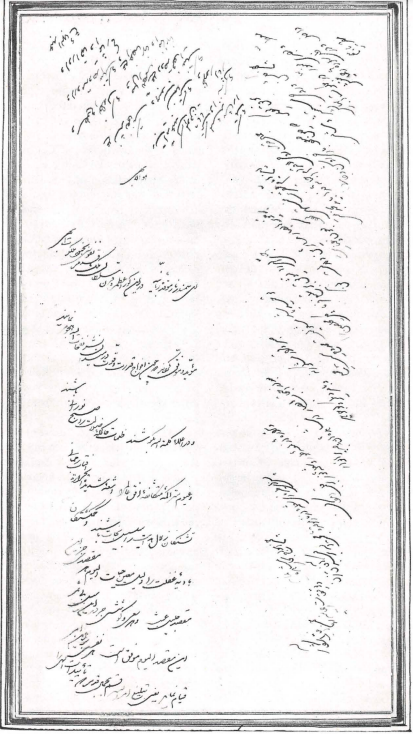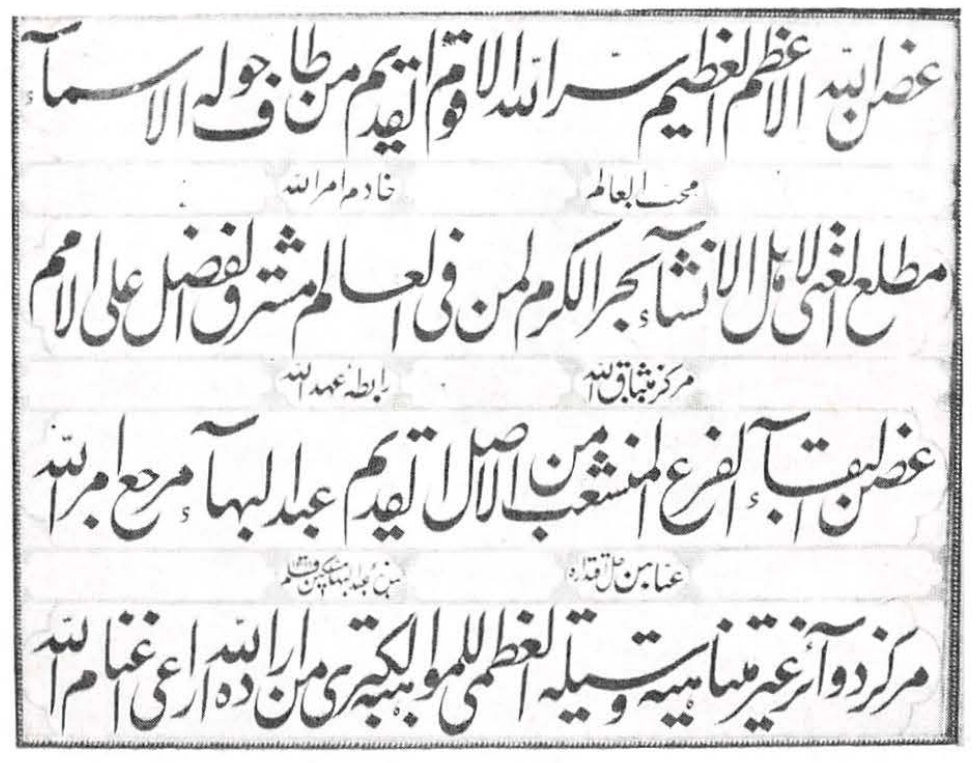
|
|
Abstract: Two excerpts from Shoghi Effendi's writings, one from "The Dispensation of Bahá'u'lláh" and the other from God Passes By. Notes: Mirrored from bahaiworld.bahai.org (part of the special collection The Mystery of God). |
The Station and Titles of 'Abdu'l-Bahá
by Shoghi Effendi
published in Bahá'í World, Vol. 15 (1968-1973)Haifa: Bahá’í World Centre, 1973-04-21
Reproduced from The Bahá'í World, Volume 15 (1968-1973) in commemoration of the 50 year anniversary of the passing of 'Abdu'l-Bahá, this piece comprises two excerpts from Shoghi Effendi's writings, one from a letter titled "The Dispensation of Bahá'u'lláh" and the other from God Passes By.
My name is 'Abdu'l-Bahá. My qualification is 'Abdu'l-Bahá. My reality is 'Abdu'l-Bahá. My praise is 'Abdu'l-Bahá. Thraldom to the Blessed Perfection is my glorious and refulgent diadem, and servitude to all the human race my perpetual religion . .. No name, no title, no mention, no commendation have I, nor will ever have, except 'Abdu'l-Bahá. This is my longing. This is my greatest yearning. This is my eternal life. This is my everlasting glory.
An attempt I strongly feel should now be made to clarify our minds regarding the station occupied by 'Abdu'l‑Bahá and the significance of His position in this holy Dispensation. It would be indeed difficult for us, who stand so close to such a tremendous figure and are drawn by the mysterious power of so magnetic a personality, to obtain a clear and exact understanding of the rôle and character of One Who, not only in the Dispensation of Bahá'u'lláh but in the entire field of religious history, fulfills a unique function. Though moving in a sphere of His own and holding a rank radically different from that of the Author and the Forerunner of the Bahá'í Revelation, He, by virtue of the station ordained for Him through the Covenant of Bahá'u'lláh, forms together with them what may be termed the Three Central Figures of a Faith that stands unapproached in the world's spiritual history. He towers, in conjunction with them, above the destinies of this infant Faith of God from a level to which no individual or body ministering to its needs after Him, and for no less a period than a full thousand years, can ever hope to rise. To degrade His lofty rank by identifying His station with or by regarding it as roughly equivalent to, the position of those on whom the mantle of His authority has fallen would be an act of impiety as grave as the no less heretical belief that inclines to exalt Him to a state of absolute equality with either the central Figure or Forerunner of our Faith. For wide as is the gulf that separates 'Abdu'l‑Bahá from Him Who is the Source of an independent Revelation, it can never be regarded as commensurate with the greater distance that stands between Him Who is the Center of the Covenant and His ministers who are to carry on His work, whatever be their name, their rank, their functions or their future achievements. Let those who have known 'Abdu'l‑Bahá, who through their contact with His magnetic personality have come to cherish for Him so fervent an admiration, reflect, in the light of this statement, on the greatness of One Who is so far above Him in station.
That 'Abdu'l‑Bahá is not a Manifestation of God, that, though the successor of His Father, He does not occupy a cognate station, that no one else except the Báb and Bahá'u'lláh can ever lay claim to such a station before the expiration of a full thousand years—are verities which lie embedded in the specific utterances of both the Founder of our Faith and the Interpreter of His teachings. …
'Abdu'l‑Bahá's own statements, in confirmation of this warning, are no less emphatic and binding: "… My station is the station of servitude—a servitude which is complete, pure and real, firmly established, enduring, obvious, explicitly revealed and subject to no interpretation whatever… I am the Interpreter of the Word of God; such is my interpretation."
. . . From such clear and formally laid down statements, incompatible as they are with any assertion of a claim to Prophethood, we should not by any means infer that 'Abdu'l‑Bahá is merely one of the servants of the Blessed Beauty, or at best one whose function is to be confined to that of an authorized interpreter of His Father's teachings. Far be it from me to entertain such a notion or to wish to instill such sentiments. To regard Him in such a light is a manifest betrayal of the priceless heritage bequeathed by Bahá'u'lláh to mankind. Immeasurably exalted is the station conferred upon Him by the Supreme Pen above and beyond the implications of these, His own written statements. Whether in the Kitáb-i-Aqdas, the most weighty and sacred of all the works of Bahá'u'lláh, or in the Kitáb-i-'Ahd, the Book of His Covenant, or in the Súriy-i-Ghusn (Tablet of the Branch), such references as have been recorded by the pen of Bahá'u'lláh—references which the Tablets of His Father addressed to Him mightily reinforce—invest 'Abdu'l‑Bahá with a power, and surround Him with a halo, which the present generation can never adequately appreciate.
He is, and should for all time be regarded, first and foremost, as the Center and Pivot of Bahá'u'lláh's peerless and all-enfolding Covenant, His most exalted handiwork, the stainless Mirror of His light, the perfect Exemplar of His teachings, the unerring Interpreter of His Word, the embodiment of every Bahá'í ideal, the incarnation of every Bahá'í virtue, the Most Mighty Branch sprung from the Ancient Root, the Limb of the Law of God, the Being "round Whom all names revolve," the Mainspring of the Oneness of Humanity, the Ensign of the Most Great Peace, the Moon of the Central Orb of this most holy Dispensation—styles and titles that are implicit and find their truest, their highest and fairest expression in the magic name 'Abdu'l‑Bahá. He is, above and beyond these appellations, the "Mystery of God"—an expression by which Bahá'u'lláh Himself has chosen to designate Him, and which, while it does not by any means justify us to assign to Him the station of Prophethood, indicates how in the person of 'Abdu'l‑Bahá the incompatible characteristics of a human nature and superhuman knowledge and perfection have been blended and are completely harmonized. …
"O Thou Who art the apple of Mine eye!" Bahá'u'lláh, in His own handwriting, thus addresses 'Abdu'l‑Bahá, "My glory, the ocean of My loving-kindness, the sun of My bounty, the heaven of My mercy rest upon Thee. We pray God to illumine the world through Thy knowledge and wisdom, to ordain for Thee that which will gladden Thine heart and impart consolation to Thine eyes." "The glory of God rest upon Thee," He writes in another Tablet, "and upon whosoever serveth Thee and circleth around Thee. Woe, great woe, betide him that opposeth and injureth Thee. Well is it with him that sweareth fealty to Thee; the fire of hell torment him who is Thine enemy." "We have made Thee a shelter for all mankind," He, in yet another Tablet, affirms, "a shield unto all who are in heaven and on earth, a stronghold for whosoever hath believed in God, the Incomparable, the All-Knowing. God grant that through Thee He may protect them, may enrich and sustain them, that He may inspire Thee with that which shall be a wellspring of wealth unto all created things, an ocean of bounty unto all men, and the dayspring of mercy unto all peoples."
"Thou knowest, O my God," Bahá'u'lláh, in a prayer revealed in 'Abdu'l‑Bahá's honor, supplicates, "that I desire for Him naught except that which Thou didst desire, and have chosen Him for no purpose save that which Thou hadst intended for Him. Render Him victorious, therefore, through Thy hosts of earth and heaven… Ordain, I beseech Thee, by the ardor of My love for Thee and My yearning to manifest Thy Cause, for Him, as well as for them that love Him, that which Thou hast destined for Thy Messengers and the Trustees of Thy Revelation. Verily, Thou art the Almighty, the All-Powerful." (Shoghi Effendi, The World Order of Bahá'u'lláh.)
He alone had been accorded the privilege of being called "the Master," an honor from which His Father had strictly excluded all His other sons. Upon Him that loving and unerring Father had chosen to confer the unique title of "Sirru'lláh" (the Mystery of God), a designation so appropriate to One Who, though essentially human and holding a station radically and fundamentally different from that occupied by Bahá'u'lláh and His Forerunner, could still claim to be the perfect Exemplar of His Faith, to be endowed with super-human knowledge, and to be regarded as the stainless mirror reflecting His light. To Him, whilst in Adrianople, that same Father had, in the Súriy-i-Ghusn (Tablet of the Branch), referred as "this sacred and glorious Being, this Branch of Holiness," as "the Limb of the Law of God," as His "most great favor" unto men, as His "most perfect bounty" conferred upon them, as One through Whom "every mouldering bone is quickened," declaring that "whoso turneth towards Him hath turned towards God," and that "they who deprive themselves of the shadow of the Branch are lost in the wilderness of error." To Him He, whilst still in that city, had alluded (in a Tablet addressed to Ḥájí Muḥammad Ibráhím-i-Khalíl) as the one amongst His sons "from Whose tongue God will cause the signs of His power to stream forth," and as the one Whom "God hath specially chosen for His Cause." On Him, at a later period, the Author of the Kitáb-i-Aqdas, in a celebrated passage, subsequently elucidated in the "Book of My Covenant," had bestowed the function of interpreting His Holy Writ, proclaiming Him, at the same time, to be the One "Whom God hath purposed, Who hath branched from this Ancient Root." To Him in a Tablet, revealed during that same period and addressed to Mírzá Muḥammad Qulíy-i-Sabzivárí, He had referred as "the Gulf that hath branched out of this Ocean that hath encompassed all created things," and bidden His followers to turn their faces towards it. To Him, on the occasion of His visit to Beirut, His Father had, furthermore, in a communication which He dictated to His amanuensis, paid a glowing tribute, glorifying Him as the One "round Whom all names revolve," as "the Most Mighty Branch of God," and as "His ancient and immutable Mystery." He it was Who, in several Tablets which Bahá'u'lláh Himself had penned, had been personally addressed as "the Apple of Mine eye," and been referred to as "a shield unto all who are in heaven and on earth," as "a shelter for all mankind" and "a stronghold for whosoever hath believed in God." It was on His behalf that His Father, in a prayer revealed in His honor, had supplicated God to "render Him victorious," and to "ordain … for Him, as well as for them that love Him," the things destined by the Almighty for His "Messengers" and the "Trustees" of His Revelation. And finally in yet another Tablet these weighty words had been recorded: "The glory of God rest upon Thee, and upon whosoever serveth Thee and circleth around Thee. Woe, great woe, betide him that opposeth and injureth Thee. Well is it with him that sweareth fealty to Thee; the fire of hell torment him who is Thy enemy."
And now to crown the inestimable honors, privileges and benefits showered upon Him, in ever increasing abundance, throughout the forty years of His Father's ministry in Baghdád, in Adrianople and in 'Akká, He had been elevated to the high office of Center of Bahá'u'lláh's Covenant, and been made the successor of the Manifestation of God Himself—a position that was to empower Him to impart an extraordinary impetus to the international expansion of His Father's Faith, to amplify its doctrine, to beat down every barrier that would obstruct its march, and to call into being, and delineate the features of, its Administrative Order, the Child of the Covenant, and the Harbinger of that World Order whose establishment must needs signalize the advent of the Golden Age of the Bahá'í Dispensation.
The immediate effect of the ascension of Bahá'u'lláh had been… to spread grief and bewilderment among His followers and companions, and to inspire its vigilant and redoubtable adversaries with fresh hope and renewed determination. …
Yet, as the appointed Center of Bahá'u'lláh's Covenant and the authorized Interpreter of His teaching had Himself later explained, the dissolution of the tabernacle wherein the soul of the Manifestation of God had chosen temporarily to abide signalized its release from the restrictions which an earthly life had, of necessity, imposed upon it. Its influence no longer circumscribed by any physical limitations, its radiance no longer beclouded by its human temple, that soul could henceforth energize the whole world to a degree unapproached at any stage in the course of its existence on this planet.
Bahá'u'lláh's stupendous task on this earthly plane had, moreover, at the time of His passing, been brought to its final consummation. His mission, far from being in any way inconclusive, had, in every respect, been carried through to a full end. The Message with which He had been entrusted had been disclosed to the gaze of all mankind. The summons He had been commissioned to issue to its leaders and rulers had been fearlessly voiced. The fundamentals of the doctrine destined to recreate its life, heal its sicknesses and redeem it from bondage and degradation had been impregnably established. The tide of calamity that was to purge and fortify the sinews of His Faith had swept on with unstemmed fury. The blood which was to fertilize the soil out of which the institutions of His World Order were destined to spring had been profusely shed. Above all the Covenant that was to perpetuate the influence of that Faith, insure its integrity, safeguard it from schism, and stimulate its world-wide expansion, had been fixed on an inviolable basis.
His Cause, precious beyond the dreams and hopes of men; enshrining within its shell that pearl of great price to which the world, since its foundation, had been looking forward; confronted with colossal tasks of unimaginable complexity and urgency, was beyond a peradventure in safe keeping. His own beloved Son, the apple of His eye, His vicegerent on earth, the Executive of His authority, the Pivot of His Covenant, the Shepherd of His flock, the Exemplar of His faith, the Image of His perfections, the Mystery of His Revelation, the Interpreter of His mind, the Architect of His World Order, the Ensign of His Most Great Peace, the Focal Point of His unerring guidance—in a word, the occupant of an office without peer or equal in the entire field of religious history—stood guard over it, alert, fearless and determined to enlarge its limits, blazon abroad its fame, champion its interests and consummate its purpose. …
The cloud of despondency that had momentarily settled on the disconsolate lovers of the Cause of Bahá'u'lláh was lifted. The continuity of that unerring guidance vouchsafed to it since its birth was now assured. The significance of the solemn affirmation that this is "the Day which shall not be followed by night" was now clearly apprehended. An orphan community had recognized in 'Abdu'l‑Bahá, in its hour of desperate need, its Solace, its Guide, its Mainstay and Champion. The Light that had glowed with such dazzling brightness in the heart of Asia, and had, in the lifetime of Bahá'u'lláh, spread to the Near East, and illuminated the fringes of both the European and African continents, was to travel, through the impelling influence of the newly proclaimed Covenant, and almost immediately after the death of its Author, as far West as the North American continent, and from thence diffuse itself to the countries of Europe, and subsequently shed its radiance over both the Far East and Australasia. (Shoghi Effendi, God Passes By.)
|
|


